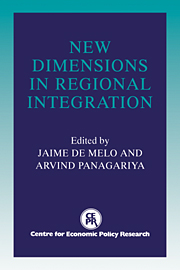Book contents
- Frontmatter
- Contents
- List of figures
- List of tables
- Preface
- Foreword
- Acknowledgements
- List of conference participants
- PART ONE SYSTEMIC ISSUES
- 1 Introduction
- 2 Regionalism and multilateralism: an overview
- Discussion
- 3 Regionalism versus multilateralism: analytical notes
- Discussion
- 4 Multilateral and bilateral trade policies in the world trading system: an historical perspective
- Discussion
- 5 GATT's influence on regional arrangements
- Discussion
- PART TWO COUNTRY ISSUES
- Index
Discussion
Published online by Cambridge University Press: 04 May 2010
- Frontmatter
- Contents
- List of figures
- List of tables
- Preface
- Foreword
- Acknowledgements
- List of conference participants
- PART ONE SYSTEMIC ISSUES
- 1 Introduction
- 2 Regionalism and multilateralism: an overview
- Discussion
- 3 Regionalism versus multilateralism: analytical notes
- Discussion
- 4 Multilateral and bilateral trade policies in the world trading system: an historical perspective
- Discussion
- 5 GATT's influence on regional arrangements
- Discussion
- PART TWO COUNTRY ISSUES
- Index
Summary
In the title of Paul Krugman's stimulating paper I would have been tempted to replace ‘versus’ connecting ‘regionalism’ and ‘multilateralism’ with an ‘and’. Herein, I think, hangs a tale. Those who view the emergence of regional efforts to establish free-trading areas, especially in Europe and North America, as a threat to the more than forty years of efforts of GATT to lower trade barriers on a multilateral basis are driven to compare the benefits of multilateralism with the potential or actual welfare-reducing possibilities of discriminatory regional arrangements. To my knowledge few economists would do an 180° turn on the comparison to argue that regional efforts raise welfare whereas multilateral reductions in trade impediments lower real incomes. ‘Regionalism and multilateralism’ reflects a different point of view: in today's world regionalism and multilateralism can coexist. Indeed, given the strong inclinations of certain regions to pursue closer economic associations among small groups of countries, there is an even more important role for GATT and international consultations to ensure that trading blocs join others in a multilateral effort to reduce obstacles to trade. Choosing between the two is not the option.
Krugman's Chapter 3 is based on a paper that is the third of a sequence inaugurated at a conference in Tel Aviv in 1989 (Krugman, 1991a). In that paper the Krugman touch is well illustrated by his analysis of the effect on world welfare of a systematic joining of countries into trading blocs, with each such bloc imposing an optimal tariff on imports. As the number of blocs decreases (with each getting larger), so does world welfare, with such welfare racing a minimum when there are three such blocs.
- Type
- Chapter
- Information
- New Dimensions in Regional Integration , pp. 79 - 89Publisher: Cambridge University PressPrint publication year: 1993



